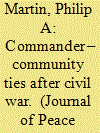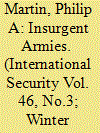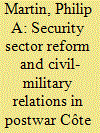| Srl | Item |
| 1 |
ID:
180199


|
|
|
|
|
| Summary/Abstract |
Ex-rebel military commanders play a central role in peacebuilding after civil war. Yet the influence and mobilization power of these actors is not uniform: in some areas commanders retain strong ties to civilian populations after war’s end, while in other areas such ties wither away. This article analyses a novel dataset of former rebel-occupied localities in Côte d’Ivoire to investigate why commander–community linkages endure or decline after post-conflict transitions. The findings support a theory of political accountability: commanders retained political capital and access to networks of supporters in areas where insurgents provided essential goods to civilians during war. By contrast, where insurgents’ wartime rule involved abuse and coercion, commanders were less likely to sustain strong ties. These findings challenge the conventional wisdom that violent warlordism explains the persistence of rebel commanders’ power in peacetime. Rather, effective wartime governance may create regionally embedded strongmen who can in turn disrupt postwar state-building.
|
|
|
|
|
|
|
|
|
|
|
|
|
|
|
|
| 2 |
ID:
183650


|
|
|
|
|
| Summary/Abstract |
Why do some winning rebel groups build obedient and effective state militaries after civil war, while others suffer military defections? When winning rebels face intense security threats during civil wars, rebel field commanders are more likely to remain obedient during war-to-peace transitions. Intense security threats incentivize militants to create more inclusive leadership structures, reducing field commanders’ incentives to defect in the postwar period. Intense security threats also reduce commanders’ capacity for postwar resistance by forcing insurgents to remain mobile and adopt shorter time horizons in rebel-governed territory, reducing the likelihood that field commanders will develop local ties and independent support bases. The plausibility of the argument is examined using a new list of winning rebel groups since 1946. Two case studies—Zimbabwe and Côte d'Ivoire—probe the causal mechanisms of the theory. The study contributes to debates about the consequences of military victory in civil war, the postwar trajectories of armed groups, and the conditions necessary for civil-military cohesion in fragile states.
|
|
|
|
|
|
|
|
|
|
|
|
|
|
|
|
| 3 |
ID:
160896


|
|
|
|
|
| Summary/Abstract |
ON JUNE 30, 2017, THE UNITED NATIONS OPERATION in Côte d’Ivoire (ONUCI) reached the end of its mandate after fourteen years of peacekeeping operations. UN officials and Ivorian national leaders framed ONUCI’s departure as another positive step in the country’s postwar recovery, declaring that the return to peace was ‘irreversible’.1 In some ways, this enthusiasm appeared warranted. Since the end of the Second Ivorian Civil War in 2011, which culminated in the arrest of former President Laurent Gbagbo by rebel troops formerly known as the Forces nouvelles, the country has experienced rapid economic recovery: GDP growth averaged 9 percent from 2012 to 2016.2 Government and UN officials have touted the success of the country’s disarmament, demobilization, and reintegration (DDR) programme, which officially processed over 60,000 ex-combatants between 2012 and 2015.3 Within the country’s armed forces, officials point to the integration of former rebels and pro-Gbagbo elements within unified military units as further evidence that Côte d’Ivoire is a model of peacebuilding and security sector reform to be emulated by Africa’s other conflict-torn states.4
|
|
|
|
|
|
|
|
|
|
|
|
|
|
|
|